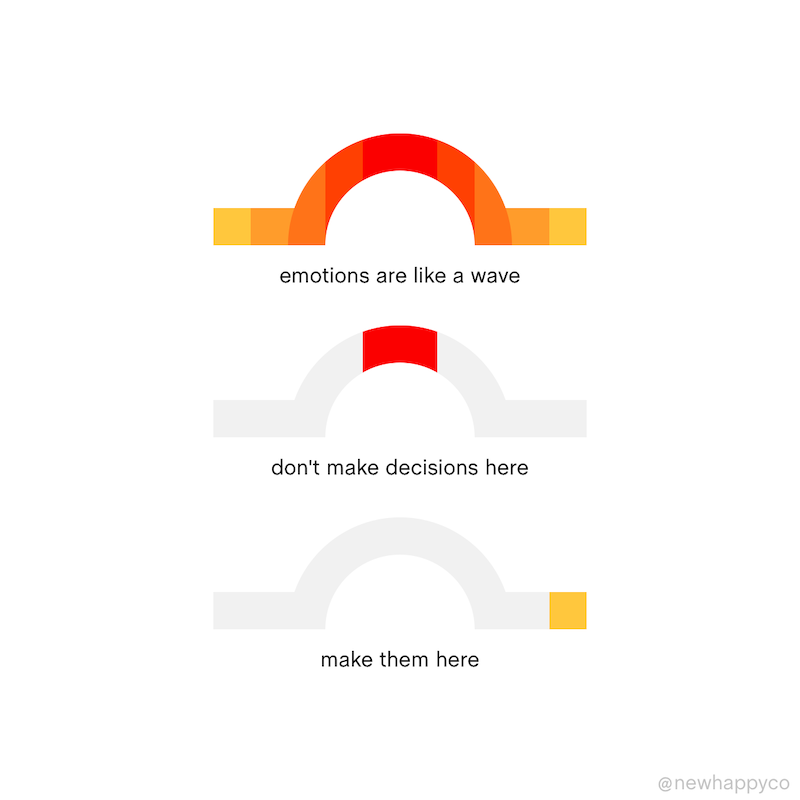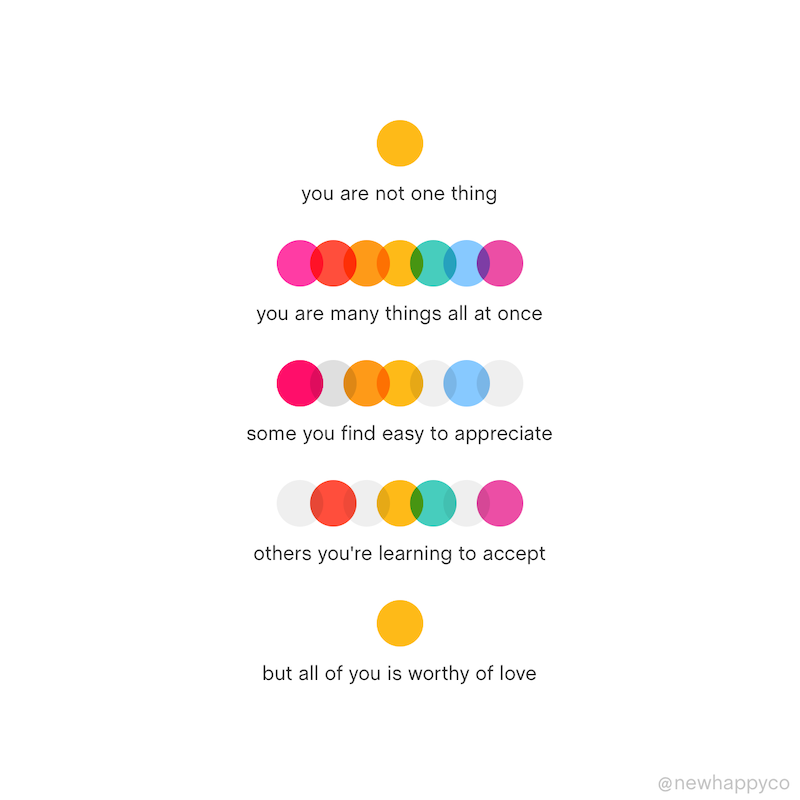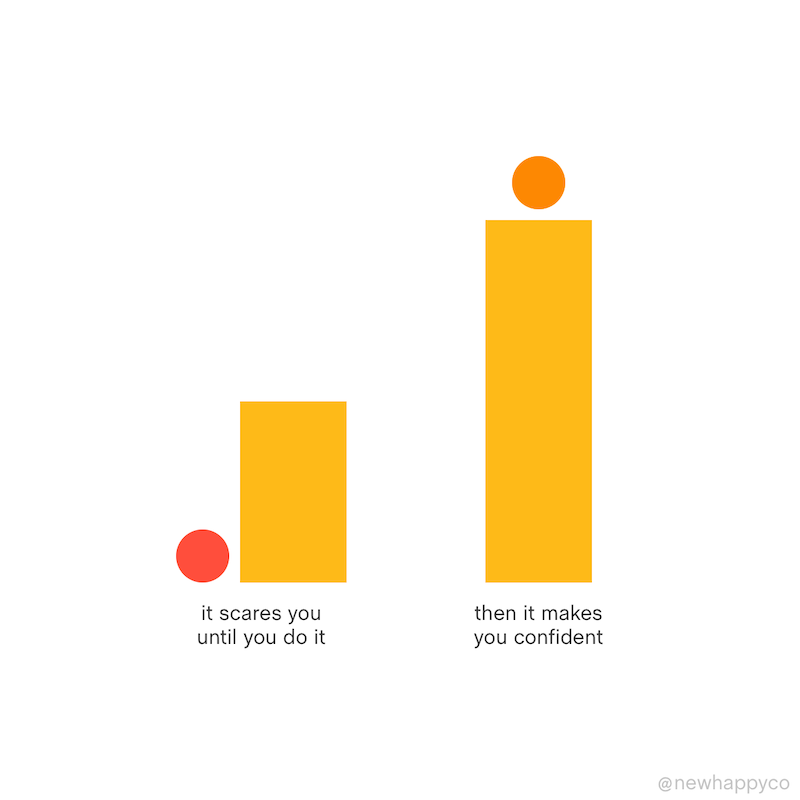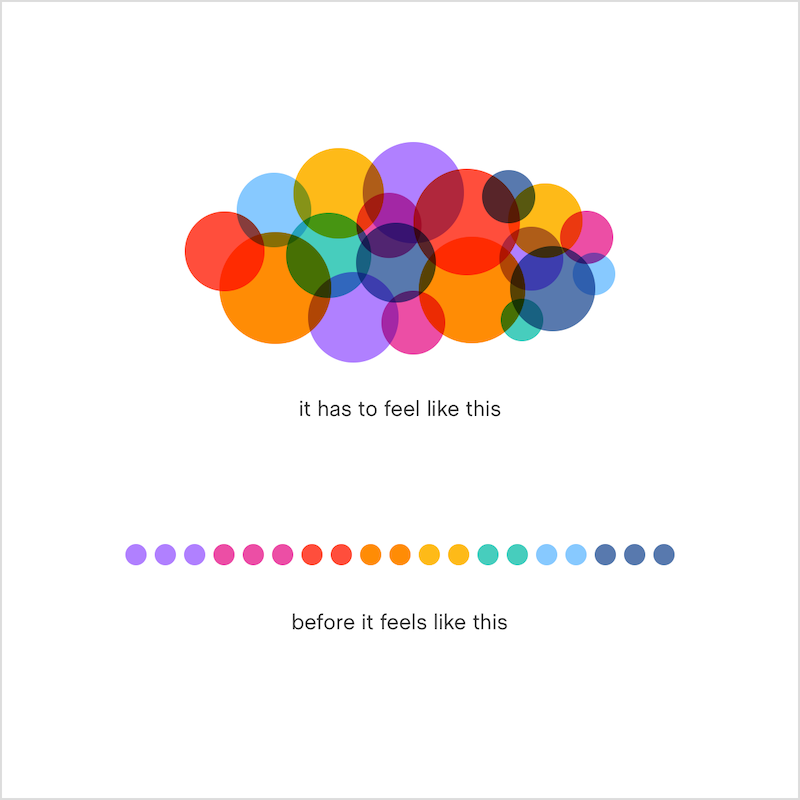Can you tell me more about your work and what you do?
I’m the founder of a company called The New Happy, and our work is focused on communicating a new philosophy of happiness that I’ve developed. The way that I like to think about it, is that philosophy is the bedrock of everything that we do. And everything else builds on that. We have a newsletter, a podcast, the artwork, which is probably what we’re most known for at this point. We make tools and resources for people that are given away for free to help them with their well-being. I also do some corporate speaking to help companies to apply these lessons, and communities as well. And I have a book which is sort of like the next phase of it. So all of those different approaches and methods of communication are all designed to help people to be happier and learn the true secrets to happiness that will hopefully help them and also help make our world a better place at the same time.
You have a daily newsletter, a daily podcast, and extensive content on social media. What has been the biggest challenge of having your work in multiple formats?
The process of getting to the point where it is today took time. I started because I had this philosophy, but I had no idea how to start sharing it with people. I thought, Okay, I like to write, so I will start it as a newsletter. And that was the sole focus for two years. And only then did I started making the artwork, and then starting to share that. After that, we expanded to offering more and more. So it’s been something that built upon itself over time. The biggest challenges have involved figuring out the best way to communicate all of these concepts and the right way to reach people. And figuring out what resonates with them, and how to help people to understand. Because a lot of these topics are based on science, they are nuanced, they’re deep questions. And so [it’s been about] figuring out how to help people understand that in a way that fits into their lives, and helps make a difference in them.
You have such a clear visual style and language in your artwork. How was the process of creating it?
I would describe the creative process as highly iterative, and full of little tests. But because a lot of our work is shared on social media, that is also a part of it. You put the work out there as you’re doing it. For the artwork, it took me probably about a year or so to figure out my voice and the style that felt authentic and worked well. That was just done through simple repetition of saying, “Every day I’m going to try and create something that helps to communicate one of these ideas. And let’s see if people connect with it. Let’s see if I feel fulfilled in the making of it.” And so slowly through that iteration, it was able to get to the place where it is today.
Striving for perfection is such a difficult and painful thing to do. I always want people to know it didn’t come out of the gate looking like this. It was something that had to be developed and refined over time. And even the artwork still goes through an iterative process every time, looking at it again, and thinking, “Okay, is this the best way to communicate it? Is there a better way to represent this message? How might we make this even clearer for people, so that we’re taking all of the work off of them so that they can instantly understand it?” I think that what I have learned throughout the process, is that, that iterative experience is really powerful for helping you to move closer to what you want.
The New Happy is such a personal project that has a lot of following on social media. And you also have your personal social media accounts where you share similar content. The project shares a philosophy that you follow and developed. How do you separate the work that you do from the person you are? Where do you draw the line?
I started making the videos on my personal account and posting content there because I was thinking about what’s another way to reach people and communicate. Some people are not interested in the artwork. And they don’t connect with it. And that’s fine. But they might still want that knowledge and information. So I thought, well if I start sharing some of these ideas through video form, some people might connect with it in that way. And so the work that I do there is another form of communication in terms of how to reach people. Because we all like to learn in different ways, and we all have an attraction to different sorts of content and methods of delivery, the videos are for people who perhaps want more of a personal explanation or want me to walk them through it and give them another way to tap into that knowledge.
The second part, which I think is really fascinating, is the separation between me and the work. This is my life’s work. This is all that I want to do with my life, to help people to be happy, and to share these ideas with them. So I view it as a profound privilege that I get to do this every day. And that I get to be of service to this community of people. I find it profoundly fulfilling meaningful, and joyful as well.
I don’t feel an inclination to have to separate myself from my work. I feel as though my work is both an expression of who I am, but also it helps me to grow as a person, and to contribute. I don’t attach my identity to it, I don’t define my value or worth as a person based upon how successful or unsuccessful The New Happy is, or the personal stuff that I do. I think I sort of have a different perspective on that in terms of viewing this as my responsibility and my duty to help people, using what I know. And I find that profoundly joyful and meaningful.
Your answer leads me to think that your work is also your purpose. But that might not be the case for most people.
I think that people get really confused about purpose. And it’s very simple if you are explaining it in the right way. The secret is that purpose is just another word for helping people. So, the problem is that most people look for their purpose by focusing on themselves. They’re focused on, “What do I want? What do I need? How do I find this thing for me?” And they don’t know any better because no one has ever taught them. And that’s the core message of a lot of my work. With a purpose, if you’re looking in all of the wrong places, you’re going to have a really hard time finding it. But if somebody lets you know that the only thing you need to find a purpose, is to focus on how you want to help other people, then it becomes a lot clearer to figure out what the next right step is, to help you to move towards it.
And so the question I always ask people is, “If there was a problem in the world, one of the many horrible things that are happening in the world, if there was one that if you had a magic wand, you could just wave it and eliminate it, and you could get rid of that problem, what would that problem be?” And most people have an answer. We all care about things. We all have certain things that affect us and break our hearts. And once you know what that problem is, then you ask yourself, “How can I help with solving this problem? I don’t have a magic wand, but I do have all of my skills, all of my knowledge, and all of my amazing human capabilities. And I can devote it to that.”
That’s what a purpose is. It’s simply finding the way that you want to help. So what I would counsel somebody who is feeling lost or struggling to figure out what their purpose is, is to identify how they want to contribute, what problem they’d like to solve, or where they simply want to show up and help one person tomorrow. And then to do that. And often that kick-starts this journey of working towards this greater overarching aim for your life, which is the technical definition of a purpose.
I was thinking about how loaded the word happy is in terms that it’s so absolute. Either you are happy or you are not. And that also feels with other words like talent, in the sense that either you are talented or not. And also with success, either you are or you are not. How can we make peace with finding the nuances between the extremes of being happy, talented, or successful?
I think we have a mistaken understanding of happiness, which is one of the sources of our problems. We have a lot of mistaken beliefs about it, but one of the big ones is that happiness is a state of perpetual bliss. So when we imagine “I’ll be happy when I get that thing, or when I achieve that. And then once I get there, once I’ve achieved this thing, then I’ll never be sad again. I’m never going to struggle. I’m never going to have a hard time.” That is just not true. I think that a happy life involves feeling all of your emotions. It involves every different part of the human experience. And one way that can help to prove that to yourself, is to think about what makes life most meaningful and important. Probably for most people, it’s their relationships. It’s the people in their life. And to have relationships with people, you will also have conflict, you will also struggle. But would you give up your relationships entirely to avoid feeling those feelings or going through those hard times? Of course not. You wouldn’t because you know that your relationships are what give you fulfillment and meaning in your life. Happiness is a way of being, it’s a way of living in a world where you recognize that you can be true to yourself and you can express yourself to be of service to others. And that you feel the satisfaction and fulfillment and contentment of that.
And you can respond to life’s challenges with grace, presence, and equanimity. And when you feel like you’re having a hard time, when you’re feeling difficult feelings, you can treat yourself with love and you can bounce back when you’re ready. When I think back to my younger self, before I started studying happiness and learned all of this, I think that she would look at me and think, “How could you be happy throughout this? You don’t have the things that you’re supposed to have. You’re not being successful in the ways you’re supposed to be. You don’t have your life all figured out.” And it just shows me how it’s so possible to transform the way that you perceive happiness and the way that you experience it. Happiness is found alongside our challenges, not after getting through them.
Have you noticed any particular topic that is the most popular on your social media? And why do you think that is?
The most popular content is always about helping reassure people that they’re not alone, that they’re not the only ones who are struggling, that they’re not the only ones who are feeling like things are hard, or that they’re lost or confused. It’s about both the validation of their personal experience, but also then the connection to our common humanity. That’s what people respond to. And when I think about the artwork specifically, what I never anticipated was how people would connect with it in such a deeply emotional way. That they would see their own experiences reflected in the visual depiction of those experiences, as either I understand them from the science, or shaped by my own life and my own emotions.
I find that miraculous because it shows me how similar we all are, how we are all going through so many of the same experiences all the time. For me, one of the greatest gifts of this artwork has been in showing the common humanity that we all share.
What do you think is the most common obstacle that people face to experiment, try something new, and be creative?
I think that for most people, it’s the psychological barriers that get in the way. Like, “I’m not good enough. Who do I think I am to create my art? How am I going to do this? What happens if X, Y, or Z happens? What will people think of me? What if they laugh at me?” And I know, I have a deep familiarity with that, because I battled through it myself, and still do. Every time I do something new, I have to overcome those voices again, reconnect to my purpose and what matters most, so that I can get out of my way and stop allowing those mistaken old happy ideas to cloud what I’m supposed to do or what I want to do. I think that for me, the only thing that worked was just shifting from focusing on myself to focusing on being of service to others. I found that the more that I thought about myself, the harder it became to get started, or to overcome my fear. The more I was focused and fixated on me, like, “How do I feel? What will people think of me?”; all that kind of stuff, the more challenging it became to ever do anything about it. And I just got more stuck and more stuck. But then when I shifted to thinking, “I have a lot of, or I have some knowledge I can offer to people, that might support them and help them. So what’s the best way to do that?” It was like unblocking my creative expression and silencing the voice in my head at the same time. And that has been transformative for me.
You’re the creator of your project, The New Happy. You are your own boss, and have a huge following on social media where there is no negative feedback. And you are about to publish a book. Is this your definition of being successful?
My definition of success is answering “Am I being who I am, and using it to help other people?” And right now, today, I get to do that. So I feel like that’s great. That’s what there is for me. And I think I used to be obsessed with achieving goals. I used to believe that once I achieved X, Y, Z goals, I would be happy forever, and all of my problems would go away, and I’d love myself and all of that stuff. And it didn’t work.
Then I started learning the research, and I learned why it doesn’t work. And so now I don’t have any long-term goals. I have this daily practice that I try to live by. And some days that look different than the previous day.
Some days it’s hard and I don’t do as much as I want to, or I don’t show up in the way that I want to. Or I feel creatively depleted, or whatever it is, I’m just having those human experiences. But it’s been a shift that has brought me so much peace that I didn’t even know was possible, from my prior achievement-oriented self. I did’t know that it was possible to feel satisfied with just focusing on doing good that day, versus punishing yourself to get to a future day when you think everything will work out.
Is there a last piece of advice or wisdom that you would like to share, or anything you would like to mention to conclude?
You have everything you need within you. You are ready. You have amazing talents, gifts, and wisdom to offer people, and the world. And you don’t need to wait. You don’t need to prove yourself. You don’t need to go and do something else. You can just start sharing right now. And your creative expression has deep meaning for so many people, most of whom you’ll never know, most of whom you’ll never understand how you’ve touched their lives. But we need it. We need you.
Stephanie Harris recommends:
Poverty, by America by Matthew Desmond
Anything by Aran Goyoaga, but especially her sourdough bread
Reading interviews with writing heroes on The Paris Review
Being kind to yourself when you make a mistake
This content originally appeared on The Creative Independent and was authored by The Creative Independent.
The Creative Independent | Radio Free (2024-10-02T07:00:00+00:00) Author Stephanie Harrison on finding purpose in supporting others. Retrieved from https://www.radiofree.org/2024/10/02/author-stephanie-harrison-on-finding-purpose-in-supporting-others/
Please log in to upload a file.
There are no updates yet.
Click the Upload button above to add an update.



